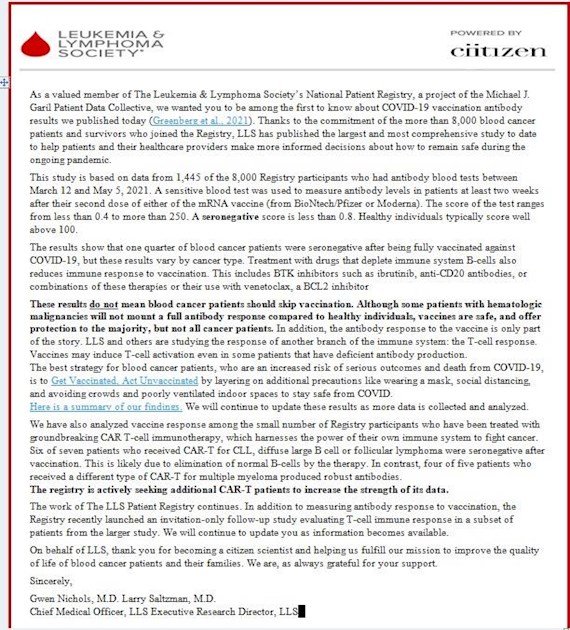As a valued member of The Leukemia & Lymphoma Society’s National Patient Registry, a project of the Michael J. Garil Patient Data Collective, we wanted you to be among the first to know about COVID-19 vaccination antibody results we published today (Greenberg et al., 2021).
i7.t.hubspotemail.net/e2t/t...
Thanks to the commitment of the more than 8,000 blood cancer patients and survivors who joined the Registry, LLS has published the largest and most comprehensive study to date to help patients and their healthcare providers make more informed decisions about how to remain safe during the ongoing pandemic.
This study is based on data from 1,445 of the 8,000 Registry participants who had antibody blood tests between March 12 and May 5, 2021. A sensitive blood test was used to measure antibody levels in patients at least two weeks after their second dose of either of the mRNA vaccine (from BioNtech/Pfizer or Moderna). The score of the test ranges from less than 0.4 to more than 250. A seronegative score is less than 0.8. Healthy individuals typically score well above 100.
The results show that one quarter of blood cancer patients were seronegative after being fully vaccinated against COVID-19, but these results vary by cancer type. Treatment with drugs that deplete immune system B-cells also reduces immune response to vaccination. This includes BTK inhibitors such as ibrutinib, anti-CD20 antibodies, or combinations of these therapies or their use with venetoclax, a BCL2 inhibitor
These results do not mean blood cancer patients should skip vaccination. Although some patients with hematologic malignancies will not mount a full antibody response compared to healthy individuals, vaccines are safe, and offer protection to the majority, but not all cancer patients. In addition, the antibody response to the vaccine is only part of the story. LLS and others are studying the response of another branch of the immune system: the T-cell response. Vaccines may induce T-cell activation even in some patients that have deficient antibody production.
The best strategy for blood cancer patients, who are an increased risk of serious outcomes and death from COVID-19, is to Get Vaccinated, Act Unvaccinated i7.t.hubspotemail.net/e2t/t...
by layering on additional precautions like wearing a mask, social distancing, and avoiding crowds and poorly ventilated indoor spaces to stay safe from COVID.
Here is a summary of our findings.
f.hubspotusercontent20.net/...
We will continue to update these results as more data is collected and analyzed.
We have also analyzed vaccine response among the small number of Registry participants who have been treated with groundbreaking CAR T-cell immunotherapy, which harnesses the power of their own immune system to fight cancer. Six of seven patients who received CAR-T for CLL, diffuse large B cell or follicular lymphoma were seronegative after vaccination. This is likely due to elimination of normal B-cells by the therapy. In contrast, four of five patients who received a different type of CAR-T for multiple myeloma produced robust antibodies.
The registry is actively seeking additional CAR-T patients to increase the strength of its data.
The work of The LLS Patient Registry continues. In addition to measuring antibody response to vaccination, the Registry recently launched an invitation-only follow-up study evaluating T-cell immune response in a subset of patients from the larger study. We will continue to update you as information becomes available.
On behalf of LLS, thank you for becoming a citizen scientist and helping us fulfill our mission to improve the quality of life of blood cancer patients and their families. We are, as always grateful for your support.
Sincerely,
Gwen Nichols, M.D. Larry Saltzman, M.D.
Chief Medical Officer, LLS Executive Research Director, LLS
Below is a summary of our findings. We will continue to update these results as more data is collected and analyzed.
COVID-19 Vaccine Response by Blood Cancer Diagnosis
Percent of patients with detectable antibodies
Smoldering multiple myeloma 100
Hairy cell leukemia 100
Hodgkin lymphoma 98
Chronic myeloid leukemia 97
Myelodysplastic syndrome/myeloproliferative neoplasm 97
Multiple myeloma 95
Acute myeloid leukemia 91
Acute lymphocytic leukemia 88
T cell lymphoma 85
Diffuse large B cell lymphoma 79
Non-Hodgkin lymphoma, not specified 79
Follicular lymphoma 78
Waldenstrom’s macroglobulinemia 74
Chronic lymphocytic leukemia 64
Marginal zone lymphoma 62
Mantle cell lymphoma 44
-
Percent of patients seronegative
Mantle cell lymphoma 56
Marginal zone lymphoma 38
Chronic lymphocytic leukemia 36
Waldenstrom’s macroglobulinemia 26
Follicular lymphoma 22
Non-Hodgkin lymphoma, not specified 21
Diffuse large B cell lymphoma 21
T cell lymphoma 15
Acute lymphocytic leukemia 12
Acute myeloid leukemia 9
Multiple myeloma 5
Myelodysplastic syndrome/myeloproliferative neoplasm 3
Chronic myeloid leukemia 3
Hodgkin lymphoma 2
Hairy cell leukemia 0
Smoldering multiple myeloma 0
Note: There were smaller numbers of patients in the Registry with blastic plasmacytoid dendritic cell neoplasm (1 patient who was seronegative), Burkitt lymphoma (1 patient with detectable antibodies), primary amyloidosis (2 patients with detectable antibodies), primary CNS lymphoma (1 patient who was seronegative, 1 patient with detectable antibodies), primary mediastinal (thymic) large B cell lymphoma (4 patients, all with detectable antibodies).
Source: The LLS National Patient Registry. Data collected from 1,445 patients who had antibody tests atleast 2 weeks after their second dose of Moderna or Pfizer mRNA vaccine. Data collected March 12 to May 5, 2021
-
COVID-19 Vaccine Antibody Response among CLL Patients by Type of Treatment
Treatment within the past 2 years Percent of patients seronegative
None 17
Obinutuzumab 90
Rituximab, acalabrutinib 85
Rituximab, ibrutinib 77
Multidrug therapy w or w/o cytotoxic chemotherapy 71
Obinutuzumab, ibrutinib 70
Obinutuzumab, acalabrutinib 66
Rituximab 63
Acalabrutinib 55
Ibrutinib 48
Ibrutinib, IVIG 40
IVIG 25
Source: The LLS National Patient Registry. Data collected from 1,845 patients with chronic lymphocytic leukemia (CLL) who had antibody tests at least 2 weeks after their second dose of Moderna or Pfizer mRNA vaccine. Data collected March 12 to June 12, 2021
-
